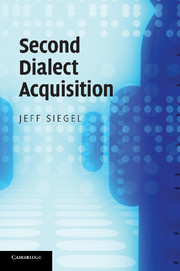Book contents
- Frontmatter
- Contents
- List of figures
- List of tables
- Acknowledgements
- List of abbreviations
- 1 Introduction
- 2 Attainment in naturalistic SDA
- 3 Acquiring a second dialect
- 4 Differential attainment: Age effects and linguistic factors
- 5 Additional individual and linguistic factors
- 6 The difficulty of SDA
- 7 SDA in classroom contexts
- 8 Educational approaches for SDA
- 9 Explaining the results and taking further steps
- Notes
- References
- Index
7 - SDA in classroom contexts
Published online by Cambridge University Press: 07 September 2010
- Frontmatter
- Contents
- List of figures
- List of tables
- Acknowledgements
- List of abbreviations
- 1 Introduction
- 2 Attainment in naturalistic SDA
- 3 Acquiring a second dialect
- 4 Differential attainment: Age effects and linguistic factors
- 5 Additional individual and linguistic factors
- 6 The difficulty of SDA
- 7 SDA in classroom contexts
- 8 Educational approaches for SDA
- 9 Explaining the results and taking further steps
- Notes
- References
- Index
Summary
We now move on to look at SDA in educational contexts. This differs from SDA in naturalistic contexts in several ways. Most significantly, the learners are normally students enrolled in a course or an educational institution who want to, or are required to, learn a new dialect for a specific purpose – usually for progressing in the formal education system or for working in a particular profession.
Chapter 1 mentioned that there are two different types of educational contexts for SDA. One normally involves individual or small-group tutoring in dialect coaching or accent modification training. In both kinds of tutoring, the learners are generally adults who have chosen to be involved in SDA, and the emphasis is on phonological features of the D2. Teaching approaches for dialect coaching and accent modification training are discussed in Chapter 8.
The other, and much more common, type of educational context for SDA is in the classroom. In most cases, the learners are initially children who come to school speaking a regional or ethnic dialect, a colloquial variety, or a pidgin or creole as their D1 – what we refer to here as unstandardised dialects or vernaculars. These students need to acquire as a D2 the standard dialect that is used in the formal education system. Adolescents and young adults who speak unstandardised dialects continue with SDA in secondary and tertiary formal education. In this context the lexical and morphosyntactic features of the D2 needed for reading and formal writing are more important than phonological features.
- Type
- Chapter
- Information
- Second Dialect Acquisition , pp. 157 - 191Publisher: Cambridge University PressPrint publication year: 2010



